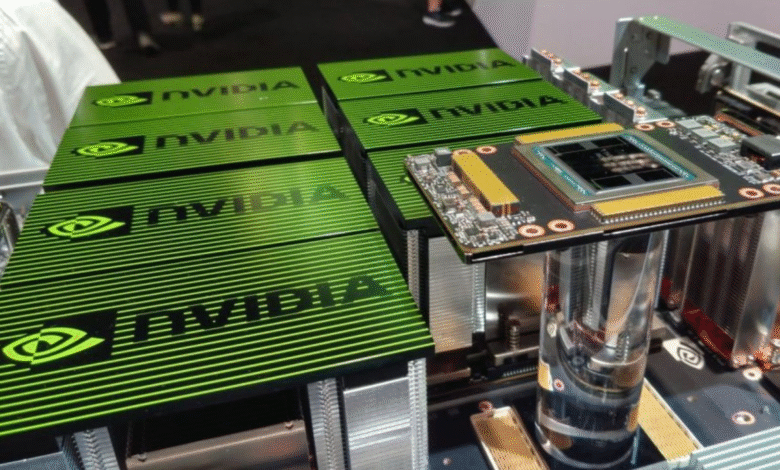Nvidia H20 Chip Production Halt Due to China Regulations

Nvidia H20 chip production is currently facing significant challenges as geopolitical tensions escalate between the U.S. and China. Reports indicate that Nvidia has requested major partners like Amkor Technology and Samsung Electronics to halt production of the H20 chips due to China’s stricter regulations on foreign technology purchases. This strategic pause in chip production reflects broader concerns surrounding AI chip sales to China and the ongoing scrutiny from Beijing regarding security implications of American technologies. With the Chinese government’s directives affecting local tech companies’ procurement processes, the future of Nvidia’s supply chain is precariously intertwined with evolving China tech regulations. As Nvidia navigates these obstacles, the implications for the chip market and the global tech landscape remain profound.
The production of Nvidia’s latest H20 semiconductor is encountering major hurdles, driven by increasing tensions and regulatory scrutiny from the Chinese government. The situation has compelled Nvidia to request its suppliers, including prominent manufacturers Amkor Technology and Samsung Electronics, to cease the fabrication of these advanced chips. Amidst allegations of security threats attributed to the H20 models, local Chinese tech firms are being urged to reconsider their procurement strategies to comply with new directives. This evolving landscape not only affects Nvidia’s operational capabilities but also highlights the complexities surrounding AI technology and its regulation in today’s market. As government policies shift and companies adapt, the ripple effects of these developments are likely to shape the future of the global semiconductor industry.
The Impact of China’s Regulations on Nvidia H20 Chip Production
Nvidia’s decision to pause the production of the H20 chips highlights the significant impact of China’s tech regulations on global supply chains. As the Chinese government intensifies scrutiny over American technology companies, Nvidia faces mounting pressure to comply with local laws. Reports suggest that Nvidia has requested major suppliers like Amkor Technology and Samsung Electronics to halt production of the H20 chips, aiming to address the heightened security concerns raised by Chinese authorities. These regulations not only impact Nvidia’s operations but also raise questions about the future of AI chip sales to China, which have been a crucial revenue stream.
Amidst these challenges, Nvidia’s CEO Jensen Huang has expressed optimism for dialogue with Chinese officials. He indicated that the concerns regarding potential backdoor access in the H20 chips have been addressed, emphasizing that the company is eager to demonstrate the chips’ security integrity. Moreover, the necessity for U.S. tech firms to navigate these vast regulatory landscapes in China reflects broader geopolitical tensions, influencing not only Nvidia’s immediate business strategies but also the overall dynamics of the global technology sector.
Nvidia’s Supply Chain Management amidst Chip Production Issues
The recent directive from Nvidia to suspend H20 chip production underscores the complexities of managing a global supply chain during uncertain times. The reliance on suppliers like Foxconn, known for its large-scale manufacturing, adds another layer of difficulty as disruptions can ripple through the entire supply chain. Nvidia’s proactive approach to communicate with its suppliers reflects an agile strategy aimed at mitigating risks associated with the unpredictability of international regulations, particularly from China, a key market for AI technologies.
As Nvidia maneuvers through these production issues, industry analysts are closely watching how such decisions will impact the company’s financial outlook. The $4.5 billion writedown on unsold H20 inventory indicates that Nvidia is feeling the pressures of compliance, and without the ability to sell these chips, potential revenue losses mount. Balancing supply chain efficiency with regulatory compliance will be critical as Nvidia seeks to reassure investors and stakeholders that it can continue to innovate in a challenging environment.
Navigating U.S.-China Tech Relations in the Chip Industry
The ongoing tensions between the U.S. and China have deeply affected technology trade, particularly in the chip industry, where Nvidia finds itself at the heart of complex negotiations. With export restrictions previously limiting sales of AI chips to China, Nvidia’s recent efforts to resume H20 chip production are compounded by national security concerns voiced by the Chinese government. This tumultuous landscape requires careful navigation as both governments scrutinize cross-border technology transfers, aiming to protect their respective national interests.
Nvidia’s engagement with policymakers in both Washington and Beijing indicates its strategic commitment to mitigating the impacts of these regulatory challenges. During discussions with government officials, CEO Jensen Huang has emphasized the importance of fostering innovation while ensuring compliance with local laws. The landscape of U.S.-China tech relations remains dynamic and uncertain, and Nvidia’s ability to adapt its business model to these shifts will be crucial for sustaining its competitive edge in the AI chip market.
The Future of AI Chip Sales to China and Nvidia’s Strategies
As the landscape around AI chip sales to China evolves, Nvidia’s strategy will likely shift to accommodate both market demands and regulatory landscapes. The initial excitement of resuming sales of H20 chips faced a setback due to recent directives from the Chinese government. Tech giants in China have reportedly been advised to reassess their reliance on Nvidia chips until a national security review is completed. This underlines a cautious approach by domestic companies in acquiring American technology amidst ongoing governmental scrutiny.
To adapt to these developments, Nvidia may need to explore alternative markets or adjust its product offerings to comply with China’s increasing demand for localized technology products. The intricate relationship between AI chip innovations and geopolitical factors will play a critical role in shaping the next steps for Nvidia. Maintaining open channels of communication with Chinese authorities and local tech companies will be essential for managing expectations and navigating potential roadblocks ahead.
Understanding the Risks of Halting Production in Chip Supply Chains
Halting production in the chip supply chain does not come without significant risks. For Nvidia, pausing the H20 chip production reflects the broader implications of compliance with Chinese regulations. Such a suspension can disrupt not just their supply chain but also lead to possible delays in product launches or fulfillment of existing contracts. As companies increasingly depend on just-in-time manufacturing strategies, any interruption can cascade through various partners, leading to potential losses in market share and customer trust.
Moreover, supply chain resilience will be put to the test as businesses adapt to a new normal that balances innovation with compliance. The technology sector, particularly in the realm of AI, faces the dual challenge of addressing security concerns while ensuring product availability amidst fluctuating trade policies. Nvidia’s ability to pivot and develop strategies to mitigate these risks will play an integral role in its future success and stability in the market.
Security Concerns Surrounding AI Chips and National Interest
National security concerns play a pivotal role in shaping the narrative surrounding AI chip technology, particularly for companies like Nvidia. The allegations regarding potential backdoors in the H20 chips raised alarms within the Chinese government as they navigate their tech landscape. This apprehension emphasizes the delicate balance between fostering technological innovation and ensuring security protocols are in place to protect national assets. As AI becomes increasingly integral to national infrastructure, nations worldwide are grappling with the need to secure their technological frontiers.
Understanding these undercurrents is crucial for Nvidia as it attempts to reassure both governments and consumers regarding the safety and legitimacy of its products. Proactive measures to engage with regulatory bodies and fulfill transparency requests about security features are essential strategies. Nvidia’s commitment to collaborating with Chinese regulators amidst these challenges will shape its reputation and long-term viability in the international market.
The Role of Geopolitics in Chip Production and Trade
Geopolitical considerations are often at the forefront of discussions surrounding chip production and international trade. The evolving relationship between the U.S. and China directly influences entities like Nvidia, which must navigate a landscape rife with uncertainty. Recent trade conflicts have led to increasing scrutiny of American technology firms operating in China, making compliance with local regulations paramount. This geopolitical environment cultivates a landscape in which companies must pivot their strategies to remain viable and competitive.
For Nvidia, the key to thriving amidst these complexities lies in its ability to foster relationships on a global scale while adhering to local policies. By engaging with both U.S. and Chinese government entities, Nvidia seeks to establish positions that not only serve its corporate interests but also align with broader national objectives. The interplay between technology, security, and international relations will continue to shape the future dynamics of the chip market, influencing how tech companies strategize in an increasingly fractured world.
The Significance of Compliance for AI Technology Firms
As an AI technology firm, Nvidia’s commitment to compliance with international regulations is more significant than ever. The legal landscape is continuously evolving, especially concerning national security demands from governments worldwide. Adhering to these regulations not only mitigates risks associated with production halts but also establishes credibility within the technology sector. This credibility becomes crucial for companies like Nvidia when trying to regain market access in regions like China, which is vital for their growth strategies.
The proactive stance Nvidia has adopted in communicating with both U.S. and Chinese regulatory bodies demonstrates the importance of navigating these compliance landscapes. Offering transparency regarding H20 chip security features can bolster Nvidia’s reputation, paving the way for the resumption of production and sales. The shift towards more stringent compliance measures underscores the overall responsibility of technology firms in ensuring that their innovations align with national interests and security requirements.
The Economic Implications of Nvidia’s Production Pause
Nvidia’s decision to pausing H20 chip production has far-reaching economic implications, not only for the company but for the wider tech industry. Analysts have predicted significant financial repercussions due to the $4.5 billion writedown on unsold inventory, showcasing how regulatory challenges can directly influence corporate finances. The inability to sell chips in a market like China—initially projected as a lucrative opportunity—profoundly affects revenue forecasts and investor confidence.
Moreover, this production pause might lead to increased scrutiny of Nvidia’s business model and its implications within the international trade arena. Competitors may capitalize on Nvidia’s setbacks, intensifying the race in innovation and chip technology. The overall economic landscape related to AI technologies will continue to evolve as companies adapt to changing regulations, potentially reshaping market dynamics in the years to come.
Frequently Asked Questions
What are the recent developments regarding Nvidia H20 chip production?
Nvidia has requested its suppliers, including Amkor Technology and Samsung Electronics, to pause production of the H20 chips due to China’s crackdown on tech purchases, citing security concerns from the Chinese government.
Why has Nvidia halted H20 chip production?
Nvidia’s decision to halt H20 chip production stems from China’s directives for local tech firms to stop buying these chips, which are associated with security risks as perceived by Beijing.
How are China tech regulations affecting Nvidia’s H20 chip sales?
China’s tech regulations are impacting Nvidia’s H20 chip sales by mandating local companies, like ByteDance and Tencent, to pause their orders amid national security reviews, which has cast uncertainty on Nvidia’s market position.
What suppliers are involved in the Nvidia H20 chip production delay?
The suppliers involved in the Nvidia H20 chip production delay include Amkor Technology, responsible for packaging, Samsung Electronics, which supplies memory components, and Foxconn, a key partner in manufacturing.
What is the impact of export restrictions on Nvidia’s H20 chip inventory?
Nvidia reported a significant writedown of $4.5 billion on its unsold H20 chip inventory following export restrictions, which indicated that sales would have been much higher without these limitations.
Are there ongoing discussions between Nvidia and the Chinese government regarding the H20 chips?
Yes, Nvidia is engaged in discussions with the Chinese government to address security concerns surrounding the H20 chips, aiming to clarify that these chips do not contain tracking technologies that could be exploited.
What are the implications of increased scrutiny on Nvidia’s H20 chip production?
Increased scrutiny on Nvidia’s H20 chip production may lead to prolonged halts in production and sales, complicating Nvidia’s ability to navigate international market dynamics and impacting its financial performance.
How is Nvidia addressing concerns about its H20 chips in China?
Nvidia is addressing concerns about its H20 chips in China by communicating directly with Chinese officials to reassure them about the security and intended use of the chips.
What future actions might Nvidia take regarding H20 chip sales to China?
Nvidia might seek to secure better export licenses and further engage in discussions with both U.S. and Chinese authorities to facilitate the sales of H20 chips, which are vital for their operations in the lucrative Chinese market.
What are the broader implications of Nvidia’s H20 chip production issues?
The issues surrounding Nvidia’s H20 chip production may highlight the complexities of U.S.-China trade relations and the challenges tech companies face amidst national security concerns and tightening regulatory environments.
| Key Point | Details |
|---|---|
| Production Halt | Nvidia is asking suppliers Amkor Technology, Samsung, and Foxconn to pause H20 chip production. |
| China’s Crackdown | The Chinese government has instructed local companies to stop purchasing H20 chips citing security concerns. |
| Security Concerns | Beijing worries that H20 chips may include tracking technologies or ‘backdoors’. |
| Market Conditions | Nvidia stated it is managing its supply chain to adapt to market conditions. |
| Government Interaction | Nvidia has discussed concerns with both the Chinese and U.S. governments regarding the H20 chips. |
Summary
Nvidia H20 chip production is currently facing significant challenges due to China’s crackdown on chip purchases, which has led the company to request a halt in production from key suppliers. This situation underscores the complexities and geopolitical tensions surrounding technology and trade, as both the U.S. and Chinese governments raise concerns over the implications of American technology in China’s market. As Nvidia navigates these challenges, the future of the H20 chip remains uncertain, highlighting the need for a balanced approach to international trade in advanced technology.



